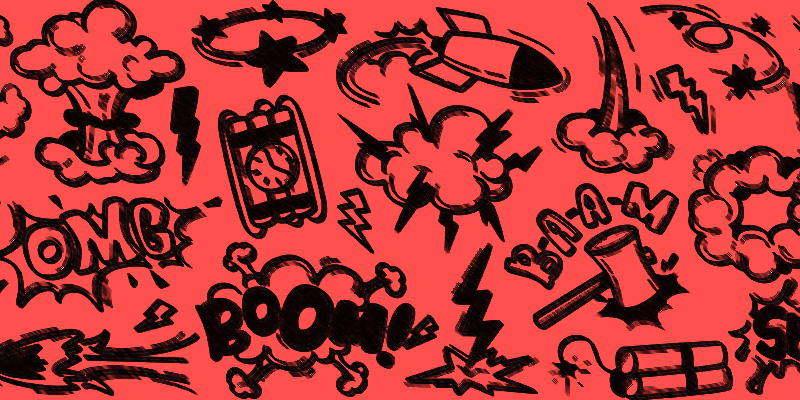
25 Legendary Literary Feuds, Ranked
Ding Ding Ding: Let the Fight Begin
They don’t make literary feuds the way they used to. Maybe authors are kinder than they used to be—or maybe they just have Twitter. Either way, I love to hear about author feuds of yore, and so I’ve collected (and ranked) twenty-five of the best below.
But first, some rules. In order to qualify as a literary feud, both parties must be literary authors in their own right (no editor-author squabbles), and the argument must be two-sided—that is, there should be at least one exchange, two shots fired. No simple unremarked-upon bad review or unacknowledged shit-talking will suffice. For instance, Bret Easton Ellis’s bizarrely vicious attacks on David Foster Wallace in the years after his death don’t rate, because Ellis is just trolling. As far as I can tell, Mark Twain simply bullied Bret Harte, who kept his mouth shut about the whole thing. The Rick Moody/Dale Peck incident—already toeing the line as Peck, while a novelist, is arguably better known as a critic—devolved into a publicity stunt. I wouldn’t count Hans Christian Andersen overstaying his welcome at Charles Dickens’s house a feud, no matter how bad his manners. Same goes for Rimbaud and Verlaine’s gun-toting lovers’ quarrel. And alas, I must also exclude Ayelet Waldman’s 2011 Twitter-salvo to Katie Roiphe: “I am so BORED with Katie Roiphe’s ‘I like the sexist drunk writers’ bullshit. She happily trashes my husband, but guess what bitch? He not only writes rings and rings and rings around you, but the same rings around your drunken literary love objects.” (Oh look, there, I included it. Hey, no wonder Roiphe doesn’t like Twitter.) On the other hand, some writers have had so many good feuds (ahem, Salman Rushdie) that I’ve had to pick and choose from among them (John le Carré over Mo Yan; Updike over Francine Prose). Which only reminds me that I’m carrying on in this introduction, so now, without further ado, please find below twenty-five fascinating author feuds from the last 200 years.
25: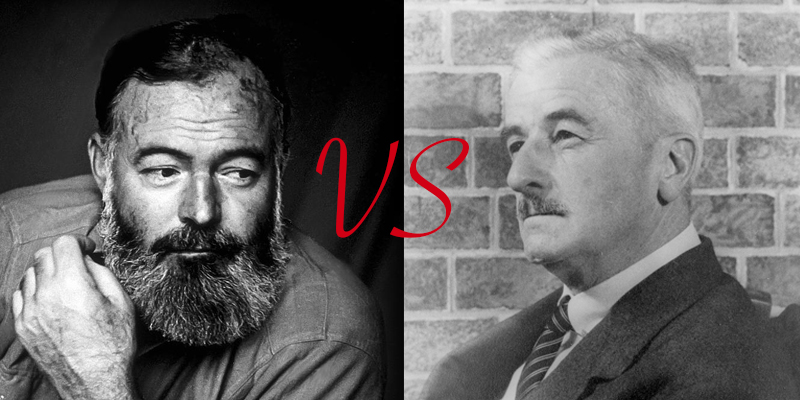
Ernest Hemingway vs. William Faulkner
This one is admittedly a bit of a stretch, feud-wise, as there was no confrontation to speak of (and one of the comments was given in private), but given the players, I consider it of interest. In a 1947 visit to a University of Mississippi creative writing class, Faulkner was asked to rank himself alongside other contemporary writers. His response, as transcribed at the time (but only published three years later, in The Western Review):
1. Thomas Wolfe: he had much courage and wrote as if he didn’t have long to live
2. William Faulkner
3. Dos Passos
4. Ernest Hemingway: he has no courage, has never crawled out on a limb. He has never been known to use a word that might cause the reader to check with a dictionary to see if it is properly used
5. John Steinbeck: at one time I had great hopes for him—now I don’t know.
According to A.E. Hotchner in his Papa Hemingway: A Personal Memoir, when Hemingway was told about Faulkner’s statement, he responded:
Poor Faulkner. Does he really think big emotions come from big words? He thinks I don’t know the ten-dollar words. I know them all right. But there are older and simpler and better words, and those are the ones I use. Did you read his last book? It’s all sauce-writing now, but he was good once. Before the sauce, or when he knew how to handle it.
24:
John Keats vs. Lord Byron
To be fair, this is more of a perennial rivalry than a true feud. Bryon was a snob and mega-privileged; Keats was middle-class and jealous of Byron’s success. Neither liked the other’s work, and both were weirdly bitter about it. John Keats, who was quite short, reportedly exclaimed to a friend after reading a good review of Byron’s work: “You see what it is to be six foot tall and a lord!” Lord Byron, after reading a good review of Keats’s, wrote to a friend:
Of the praises of that little dirty blackguard KEATES in the Edinburgh—I shall observe as Johnson did when Sheridan the actor got a pension. “What has he got a pension? then it is time that I should give up mine.”—Nobody could be prouder of the praises of the Edinburgh than I was—or more alive to their censure—as I showed in EB and SR—at present all the men they have ever praised are degraded by that insane article.—Why don’t they review & praise “Solomon’s Guide to Health” it is better sense—and as much poetry as Johnny Keates.
Keats died of tuberculosis at only 25, and some of his friends, including Percy Bysshe Shelley, claimed that his death had been hastened by the stress caused by negative reviews of his work in The Quarterly Review. Byron found that hilarious. He even made fun of him, posthumously, in his famous epic poem Don Juan:
John Keats, who was killed off by one critique,
Just as he really promised something great,
If not intelligible, —without Greek
Contrived to talk about the Gods of late,
Much as they might have been supposed to speak.
Poor fellow! His was an untoward fate: —
‘Tis strange the mind, that very fiery particle,
Should let itself be snuffed out by an Article.
23: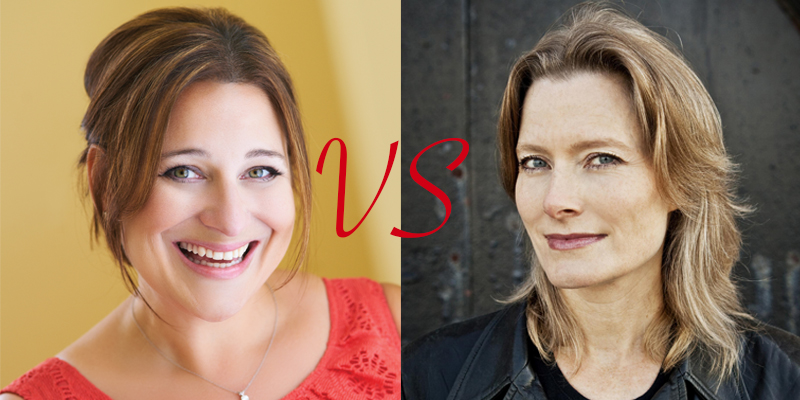
Jennifer Weiner vs. Jennifer Egan
In the most mutual of Weiner’s myriad literary beefs, she took issue with Jennifer Egan after she won the Pulitzer and told the Washington Post:
My focus is less on the need for women to trumpet their own achievements than to shoot high and achieve a lot. What I want to see is young, ambitious writers. And there are tons of them. Look at The Tiger’s Wife. There was that scandal with the Harvard student who was found to have plagiarized. But she had plagiarized very derivative, banal stuff. This is your big first move? These are your models? I’m not saying you should say you’ve never done anything good, but I don’t go around saying I’ve written the book of the century. My advice for young female writers would be to shoot high and not cower.
Soon after, Weiner complained on Twitter: “Agh. Did Egan really have to pause, mid-victory lap, to call Kinsella, McCafferty “derivative and banal?”” and soon after tweeted: “And there goes my chance to be happy that a lady won the big prize. Thanks, Jenny Egan. You’re a model of graciousness.”
Weiner started a major discussion, but both she and Egan later apologized.
22: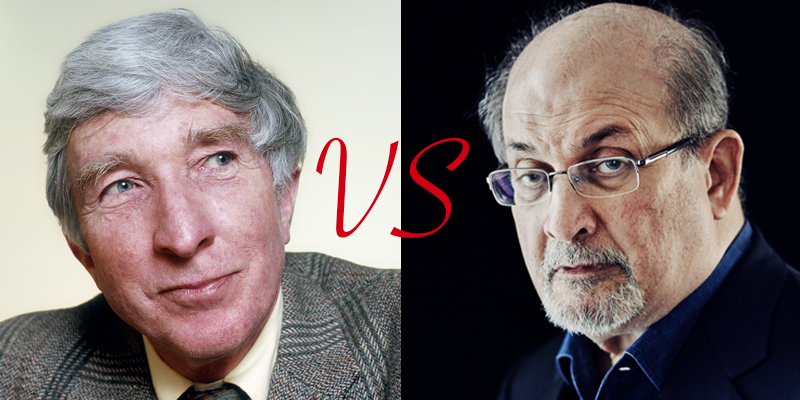
John Updike vs. Salman Rushdie
Much smaller than Rushdie’s disagreement with John le Carré, but still a good mini-feud. In 2006, John Updike reviewed Rushdie’s Shalimar the Clown in the New Yorker. His opening line was this: “Why, oh why, did Salman Rushdie, in his new novel, Shalimar the Clown, call one of his major characters Maximilian Ophuls?” He goes on: “Readers of this review will be spared, as the reviewer was not, the maddening exercise of trying to overlay Rushdie’s Ophuls with the historical one. The two have no connection save the name and a peripatetic life.”
“A name is just a name,” Rushdie told the Guardian when asked about the review. “‘Why, oh why. . . ?’ Well, why not? Somewhere in Las Vegas there’s probably a male prostitute called ‘John Updike’. The thing that disappointed me most about Updike is that he did not say in that review that he had just completed a novel about terrorism. He had to sweep me out of the way in order to make room for himself. I don’t subscribe to the very predominantly English admiration of Updike. If you take away Rabbit is Rich and Rabbit at Rest, and some of the short stories, there’s a lot of . . . slightly . . . garbage. Think of The Coup! The new one is beyond awful. He should stay in his parochial neighbourhood and write about wife-swapping, because it’s what he can do. . . I’m allowed to say it, because he was really rude about me.”
21: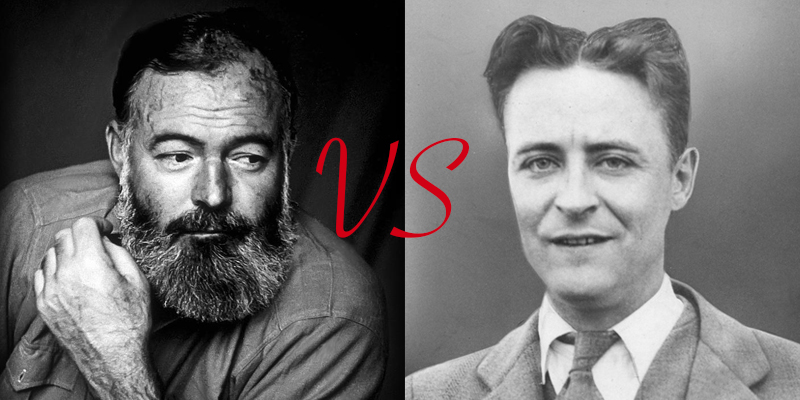
Ernest Hemingway vs. F. Scott Fitzgerald
Literary history’s most famous frenemies met in 1925, and soon became friends—Fitzgerald even sang Hemingway’s praises to the influential editor Maxwell Perkins, helping to jump-start his career. But Hemingway wasn’t particularly grateful, and soon began badmouthing Fitzgerald. In a (fairly negative) review of Scott Donaldson’s book about the pair, Michiko Kakutani writes,
Hemingway, who ”could ill abide being beholden to anyone,” clearly resented Fitzgerald’s help, and in this book, as in many others, he receives the bulk of the blame for the friendship’s demise. He emerges from these pages as an ingrate and bully, a megalomaniac who projected his own insecurities onto those closest to him and who believed he needed to reject friends and lovers before they could reject him. Fitzgerald, in contrast, comes across as a well-meaning but annoying fellow who hero-worshiped the wrong people, and who consistently sabotaged himself by getting drunk and behaving like a fool.
. . .
Hemingway was condescending about Fitzgerald’s work and mocked his former friend as a coward, a lap dog to the rich and a henpecked husband in thrall to a manipulative woman. He likened Fitzgerald to a dying butterfly, a glass-jawed boxer and an unguided missile crashing to earth on a ”very steep trajectory.”
Ten years after Fitzgerald’s death, Hemingway wrote:
I never had any respect for him ever, except for his lovely, golden, wasted talent. If he would have had fewer pompous musings and a little sounder education it would have been better maybe. But anytime you got him all straightened out and taking his work seriously Zelda would get jealous and knock him out of it. Also alcohol, that we use was the Giant Killer, and that I could not have lived without many times; or at least would have cared to live without; was a straight poison to Scott instead of a food.
20: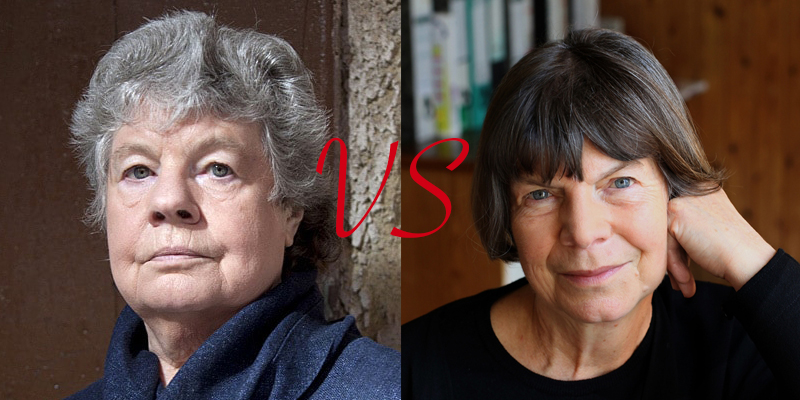
A.S. Byatt vs. Margaret Drabble
Byatt and Drabble are unique on this list: they are not only enemies, but sisters—and their enmity goes back further than their writing careers. They were highly competitive as children, pitted against one another by their mother, who reportedly favored Drabble. According to the Telegraph, their relationship was further damaged by Drabble’s decision to become a novelist. “Sue always wanted to write,” Drabble said. “I didn’t want to. I just happened to write a novel when I was pregnant and had nothing to do.” And yet her first novel came out before her elder sister’s. But what really sealed it was Byatt’s The Game. “She may not have known what she had done until she had written it,” Drabble told theTelegraph. “Writers are like that. But it’s a mean-spirited book about sibling rivalry and she sent it to me with a note signed ‘With love,’ saying ‘I think I owe you an apology’. . . It’s irresoluble now. It’s sad, but beyond repair, and I don’t think about it much any more.”
19: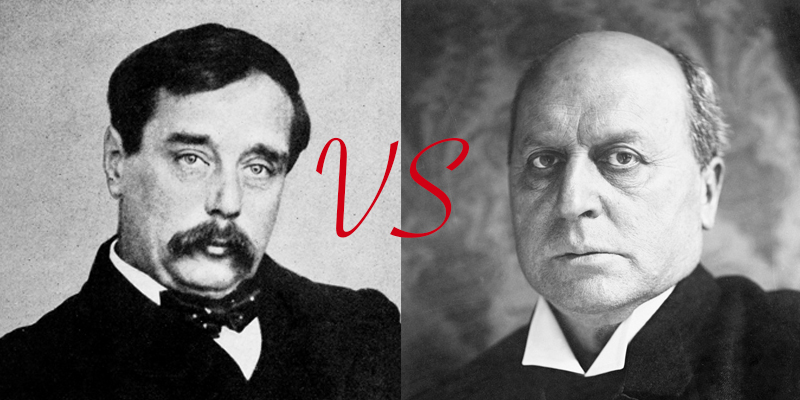
H.G. Wells vs. Henry James
Like others on this list, Wells and James started off as friends and mutual admirers. But they disagreed fundamentally on what literature was for, and in 1915, Wells published Boon, a satirical novel that mocked James’s writing style. When James read it, he wrote to Wells somewhat wounded:
I have more or less mastered your appreciation of H. J., which I have found very curious and interesting after a fashion—though it has naturally not filled me with a fond elation. It is difficult of course for a writer to put himself fully in the place of another writer who finds him extraordinarily futile and void, and who is moved to publish that to the world—and I think the case isn’t easier when he happens to have enjoyed the other writer from far back—
James summarizes the appeal of his own works this way: “They rest upon my measure of fullness—fullness of life and the projection of it, which seems to you such an emptiness of both.”
Wells wrote back:
To you literature like painting is an end, to me literature like architecture is a means, it has a use. Your view was, I felt, altogether too prominent in the world of criticism and I assailed it in lines of harsh antagonism. And writing that stuff about you was the first escape I had from the obsession of this war. Boon is just a waste-paper basket. Some of it was written before I left my home at Sandgate (1911), and it was while I was turning over some old papers that I came upon it, found it expressive, and went on with it last December. I had rather be called a journalist than an artist, that is the essence of it, and there was no other antagonist possible than yourself. But since it was printed I have regretted a hundred times that I did not express our profound and incurable contrast with a better grace.
James’s reply was his last to Wells:
My dear Wells.
I am bound to tell you that I don’t think your letter makes out any sort of case for the bad manners of Boon, as far as your indulgence in them at the expense of your poor old H. J. is concerned — I say “your” simply because he has been yours, in the most liberal, continual, sacrificial, the most admiring and abounding critical way, ever since he began to know your writings: as to which you have had copious testimony. Your comparison of the book to a waste-basket strikes me as the reverse of felicitous, for what one throws into that receptacle is exactly what one doesn’t commit to publicity and make the affirmation of one’s estimate of one’s contemporaries by. I should liken it much rather to the preservative portfolio or drawer in which what is withheld from the basket is savingly laid away. Nor do I feel it anywhere evident that my “view of life and literature,” or what you impute to me as such, is carrying everything before it and becoming a public menace—so unaware do I seem, on the contrary, that my products constitute an example in any measurable degree followed or a cause in any degree successfully pleaded: I can’t but think that if this were the case I should find it somewhat attested to in their circulation—which, alas, I have reached a very advanced age in the entirely defeated hope of.
. . .
I absolutely dissent from the claim that there are any differences whatever in the amenability to art of forms of literature aesthetically determined, and hold your distinction between a form that is (like) painting and a form that is (like) architecture for wholly null and void. There is no sense in which architecture is aesthetically “for use” that doesn’t leave any other art whatever exactly as much so; and so far from that of literature being irrelevant to the literary report upon life, and to its being made as interesting as possible, I regard it as relevant in a degree that leaves everything else behind. It is art that makes life, makes interest, makes importance, for our consideration and application of these things, and I know of no substitute whatever for the force and beauty of its process. If I were Boon I should say that any pretence of such a substitute is helpless and hopeless humbug; but I wouldn’t be Boon for the world, and am only yours faithfully,
Henry James
18:
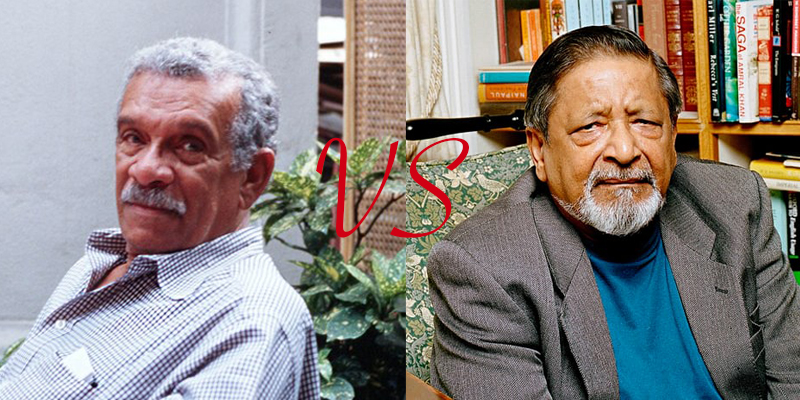
Derek Walcott vs. V.S. Naipaul
“It’s going to be nasty,” Derek Walcott told the audience at the Calabash International Literary Festival in 2008. He then proceeded to read a poem entitled “The Mongoose,” which begins:
I have been bitten. I must avoid infection
Or else I’ll be as dead as Naipaul’s fiction.
Read his last novels. You’ll see just what I mean:
A lethargy approaching the obscene.
Snap. But what had Naipaul done to deserve such treatment? According to the Guardian:
For years, the writers [had] discreetly sniped at one another in print and in interviews. Naipaul’s inclusion of an essay on Walcott in his 2007 memoir A Writer’s People—and its attendant publication in the Guardian—delivered a backhanded compliment by effusively praising Walcott’s earliest work [he calls Walcott “a man whose talent has been all but strangled by his colonial setting”], and seems to have provoked the poet into making such a public attack.
17: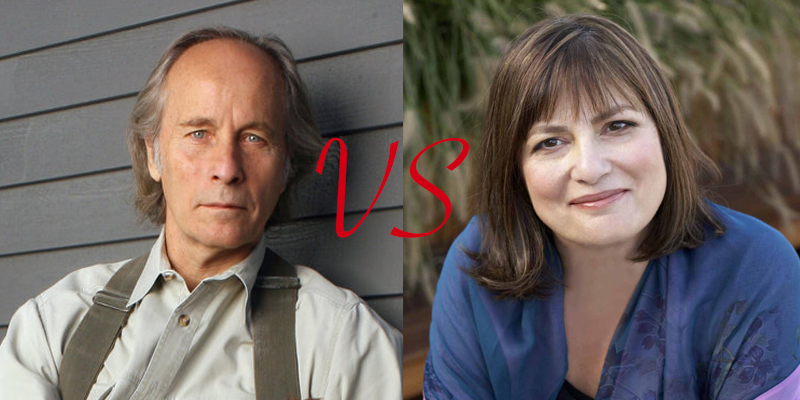
Richard Ford vs. Alice Hoffman
Never one to take a bad review well, that Richard Ford. Famously, after Alice Hoffman published a critical but not savage review of The Sportswriter in the New York Times, Richard Ford took a gun and shot a hole through one of Hoffman’s novels before mailing it to her in pieces. “Well my wife shot it first,” Ford told the Guardian, “rather proudly.” “She took the book out into the back yard, and shot it. But people make such a big deal out of it—shooting a book—it’s not like I shot her.” Still, you can tell he was thinking about it.
16: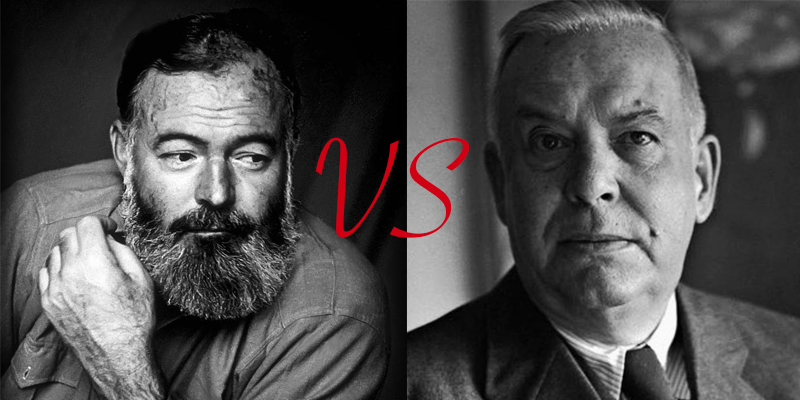
Ernest Hemingway vs. Wallace Stevens
I’ll just let Papa tell it himself (in a 1936 letter to Sara Murphy):
Hangover came about through visit of my lawyer Mr. (Maurice) Speiser whom I cannot see without the aid and abettment of alcohol plus seeing off in southern farewell the Judge (Arthur Powell) of the Wallace Stevens evening (when Hemingway and the poet Wallace Stevens had a fistfight). Remember that Judge and Mr. Stevens? Nice Mr. Stevens. This year he came again sort of pleasant like the cholera and first I knew of it my nice sister Ura (Ursula) was coming into the house crying because she had been at a cocktail party at which Mr. Stevens had made her cry by telling her forcefully what a sap I was, no man, etc. So I said, this was a week ago, ”All right, that’s the third time we’ve had enough of Mr. Stevens.” So headed out into the rainy past twilight and met Mr. Stevens who was just issuing from the door haveing just said, I learned later, ”By God I wish I had that Hemingway here now I’d knock him out with a single punch.” So who should show up but poor old Papa and Mr. Stevens swung that same fabled punch but fertunatly missed and I knocked all of him down several times and gave him a good beating. Only trouble was that first three times put him down I still had my glasses on. Then took them off at the insistence of the judge who wanted to see a good clean fight without glasses in it and after I took them off Mr. Stevens hit me flush on the jaw with his Sunday punch bam like that. And this is very funny. Broke his hand in two places. Didn’t harm my jaw at all and so put him down again and then fixed him good so he was in his room for five days with a nurse and Dr. working on him. But you mustn’t tell this to anybody. Not even Ada (MacLeish, wife of the poet Archibald MacLeish). Because he is very worried about his respectable insurance standing and I have promised not to tell anybody and the official story is that Mr. Stevens fell down a stairs. I agreed to that and said it was o.k. with me if he fell down the lighthouse stairs. So please promise not to tell anybody. But Pauline who hates me to fight was delighted. Ura had never seen a fight before and couldn’t sleep for fear Mr. Stevens was going to die. Anyway last night Mr. Stevens comes over to make up and we are made up. But on mature reflection I don’t know anybody needed to be hit worse than Mr. S. Was very pleased last night to see how large Mr. Stevens was and am sure that if I had had a good look at him before it all started would not have felt up to hitting him. But can assure you that there is no one like Mr. Stevens to go down in a spectacular fashion especially into a large puddle of water in the street in front of your old waddel street home where all took place. So I shouldn’t write you this but news being scarce your way and I know you really won’t tell anybody will you really absolutely seriously. Because otherwise I am a bastard to write it. He apologised to Ura very handsomely and has gone up to Pirates Cove to rest his face for another week before going north. I think he is really one of those mirror fighters who swells his muscles and practices lethal punches in the bathroom while he hates his betters. But maybe I am wrong. Anyway I think Gertrude Stein ought to give all these people who pick fights with poor old papa at least their money back. I am getting damned tired of it but not nearly as tired of it as Mr. Stevens got. It was awfully funny to have a man just declaring how he was going to annihilate you and show up just at that moment. Then have him land his awful punch on your jaw and nothing happen except his hand break. You can tell Patrick. It might amuse him. But don’t tell anybody else. Tell Patrick for statistics sake Mr. Stevens is 6 feet 2 weighs 225 lbs. and that when he hits the ground it is highly spectaculous. I told the Judge, the day after, to tell Mr. S. I thought he was a damned fine poet but to tell him he couldn’t fight. The Judge said, ”Oh, but your wrong there. He is a very good fighter. Why, I saw him hit a man once and knock him the length of this room.” And I said, ”Yes, Judge. But you didn’t catch the man’s name, did you?” I think it was a waiter. Nice dear good Mr. Stevens. I hope he doesn’t brood about this and take up archery or machine gunnery. But you promise you won’t tell anybody.
Of course, Hemingway was 20 years younger than Stevens at this time. But more importantly: what a gossip.
15: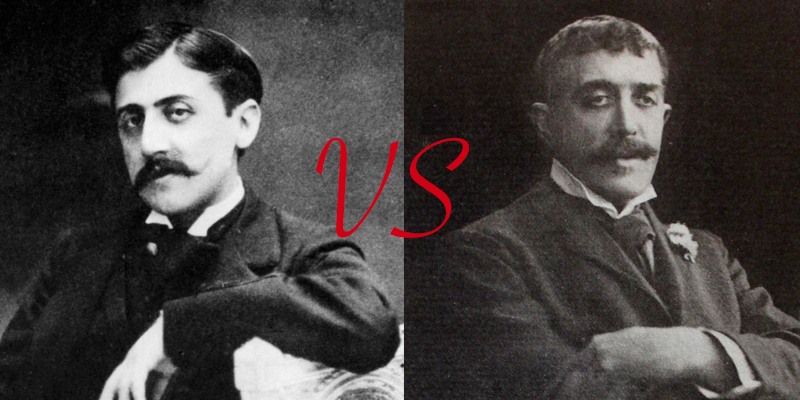
Marcel Proust vs. Jean Lorrain
Probably one of the few times that a book review led to an actual, pistols-drawn duel—but not actually because of the book in question. In an 1896 review of Proust’s Pleasures and Days, Lorrain suggested that he was gay, and described him as “one of those pretty little society boys who’ve managed to get themselves pregnant with literature.” After a second snarky essay a few months later, in which Lorrain (writing under a pseudonym) insinuated that Proust was having an affair with Lucien Daudet (the son of M. Alphonse Daudet), Proust challenged Lorrain to a duel. (Both Proust and Lorrain, by the way, were definitely gay.) Both shots went wide—probably on purpose—and everyone’s honor was restored.
14: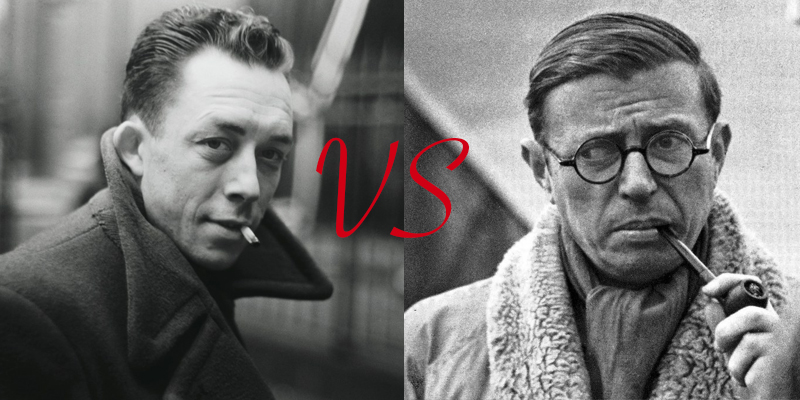
Albert Camus vs. Jean-Paul Sartre
Trust these two to have a falling-out over the concept of the freedom of man. Here’s a fun sum-up:
13: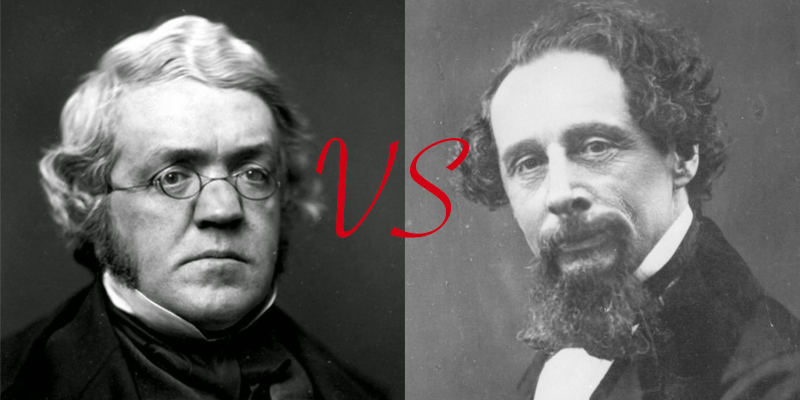
William Thackeray vs. Charles Dickens
To be fair, Dickens used a patsy in his feud with Thackeray—but I’ll still count it on principle. The two were close friends and eventually literary rivals, though Dickens reached fame and critical approval first. Things were only as tense as could be expected until the famous “Garrick Club Affair,” which ruined their friendship.
Here’s what happened: In 1858 Charles Dickens separated from his wife, and Thackeray let it slip that Dickens was having an affair with a teenage actress, Ellen Ternan. In response, Dickens let one of his protégés, Edmund Yates, publish a slanderous attack of Thackeray in Dickens’s magazine Household Words.
“Mr. Thackeray is forty-six years old, though from the silvery whiteness of his hair he appears somewhat older,” the piece began.
His face is bloodless, and not particularly expressive, but remarkable for the fracture of the bridge of the nose, the result of an accident in youth. . . No one meeting him could fail to recognise in him a gentleman; his bearing is cold and uninviting, his style of conversation either openly cynical, or affectedly good-natured and benevolent; his bonhomie is forced, his wit biting, his pride easily touched—but his appearance is invariably that of the cool, suave, well-bred gentleman, who, whatever may be rankling within, suffers no surface display of his emotion.
Worse:
Our own opinion is, that his success is on the wane; his writings never were understood or appreciated even by the middle classes; the aristocracy have been alienated by his American onslaught on their body, and the educated and refined are not sufficiently numerous to constitute an audience; moreover, there is a want of heart in all he writes, which is not to be balanced by the most brilliant sarcasm, and the most perfect knowledge of the workings of the human heart.
Thackeray wrote to Yates: “As I understand your phrases, you impute insincerity to me when I speak good-naturedly in private; assign dishonorable motives to me for sentiments which I have delivered in public, and charge me with advancing statements which I have never delivered at all. . . I am obliged to take notice of articles which I consider to be not offensive and unfriendly merely, but slanderous and untrue.” But the real problem was that Yates had lifted conversations from the privacy of the Garrick Club, where all three men (Thackeray, Dickens, Yates) were members, and where, as Thackeray puts if “I and other gentlemen have been in the habit of talking without any idea that our conversation would supply paragraphs for professional vendors of ‘Literary Talk.'”
Thackeray put the issue to the Garrick Club, who—despite a letter from Dickens pleading in support of Yates—kicked him out. He continued to write more articles and even a book criticizing Thackeray, and Dickens resigned from the club. “I never exchanged a word except of kindness with this Mr. Yates until the appearance of this article against me,” Thackeray wrote to Charles Kingsley. “What pains me most is that Dickens should have been his adviser: and next that I should have had to lay a heavy hand on a young man who, I take it, has been cruelly punished by the issue of the affair and I believe is hardly aware of the nature of his own offense and doesn’t even understand that a gentleman should resent the monstrous insult which he volunteered.” And to his mother, Thackeray wrote, “I am become a sort of great man in my way—all but at the top of the tree; indeed there if truth be known and having a great fight up there with Dickens.” He was sad at the loss of his friend; but reportedly the two made up after a chance encounter only a few months before Thackeray’s death.
12: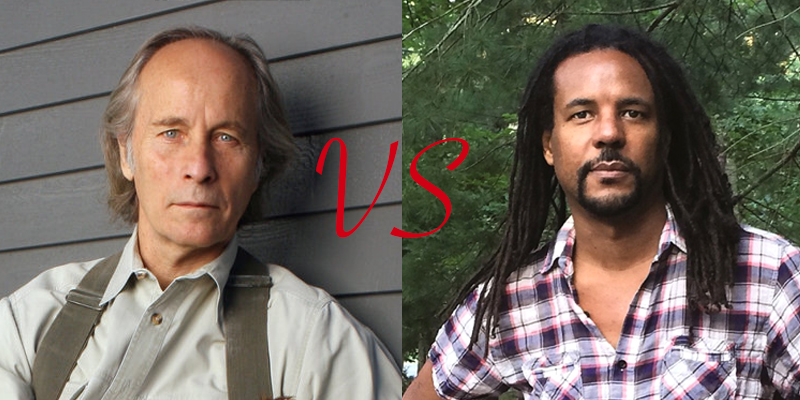
Colson Whitehead vs. Richard Ford
In 2002, Colson Whitehead reviewed Richard Ford’s A Multitude of Sins for the New York Times Book Review. It was not a positive review. “Almost every story deals with adultery, invariably in one of two stages: in the final dog days of an affair, or in the aftermath of an affair,” Whitehead wrote.
The characters are nearly indistinguishable. If I were an epidemiologist, I’d say that some sort of spiritual epidemic had overtaken a segment of our nation’s white middle-class professionals, and has started to afflict white upper-middle-class professionals. These characters could use some good advice, and if they had friends, they might be able to ask for it, but they don’t have friends. Sometimes the men are named Roger or Tom, sometimes the women are named Nancy or Frances. If they have children, we rarely see them. Some of them meet in fancy hotel rooms, others prefer out-of-the-way motels. Whatever the specifics, adulterous or not, they bide their time for opportunities to offer portentous declarations about their predicaments like: ”Other people affect you. It’s really no more complicated than that’ and ‘I am sure now that all of this had to do with my impending failures.’ These declarations will strike you as plain-spoken and hard-earned wisdom, or easy banalities, depending on your mood or level of generosity.
Two years later, Ford was still pissed enough to approach Whitehead at a Poets & Writers party. “I’ve waited two years for this,” he said. “You spat on my book.” Then he spat on Whitehead. Reporting this to Deborah Schoenman, Whitehead said, “We had a few heated words—he said, ‘You’re a kid, you should grow up,’ which coming from him was a bit funny—and then he stalked off. This wasn’t the first time some old coot had drooled on me, and it probably won’t be the last. But I would like to warn the many other people who panned the book that they might want to get a rain poncho, in case of inclement Ford.”
And fifteen years on, Ford is sticking to his guns. “I realize that how I feel about my bad treatment is only one compass point among several legitimate ones,” he wrote in Esquire last summer. “But I can tell you that, as of today, I don’t feel any different about Mr. Whitehead, or his review, or my response.” Most people think he’s rather in the wrong.
11: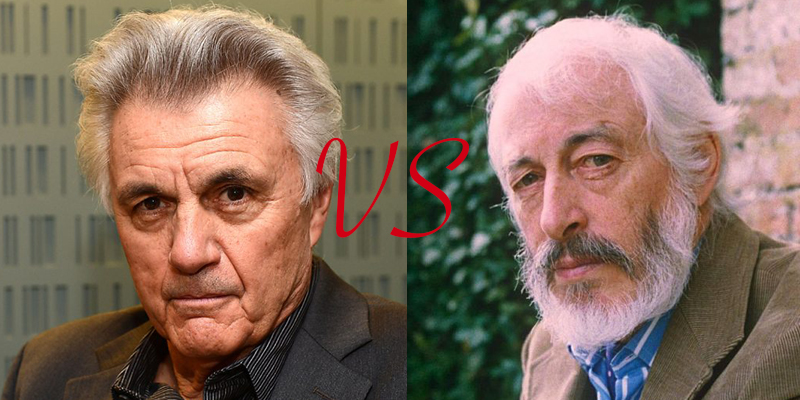
John Irving vs. J.P. Donleavy
In a 1986 interview with the Paris Review, John Irving described meeting J.P. Donleavy at the Iowa Writers’ Workshop.
I went to the airport to meet him; I’d written three novels—but not yet The World According to Garp; I wasn’t famous. I didn’t expect Donleavy to have read anything of mine, but I was surprised when he announced that he read no one living; then he asked if we were in Kansas. I told him a little about the Workshop, but he was one of those writers with no knowledge about writing programs and many prejudices about them: to be a student of writing was a waste of time; better to go out and suffer. He was wearing a very expensive three-piece suit, very handsome shoes, and handling a very posh walking stick at the time, and I began to get irritated. In a meeting with Workshop students, he told them that any writer who was lowering himself by teaching writing wasn’t capable of teaching them anything.
. . .
Cheever tried a few times to engage Donleavy in some conversation, and as Cheever was as gifted in conversation as any man I have ever met, I grew more and more furious at Donleavy’s coldness and unresponsiveness and total discourtesy. I was thinking, frankly, that I should throw the lout in a puddle, if there was one handy, when Cheever spoke up. “Do you know, Mr. Donleavy,” Cheever said, “that no majorwriter of fiction was ever a shit to another writer of fiction, except Hemingway—and he was crazy?” That was all. Donleavy had no answer. Perhaps he thought Hemingway was still a living writer and therefore hadn’t read him, either.
. . .
I should add that drinking wasn’t the issue of this unpleasant evening; Cheever was not drinking; Donleavy wasn’t drunk—he was simply righteous and acting the prima donna. I feel a little like I’m tattling on a fellow schoolboy to tell this story, but I felt so awful—not for myself but for Cheever. It was such an outrage; that Donleavy—this large, silly man with his walking stick—was snubbing John Cheever. I suppose it’s silly that I should still be angry, but George Plimpton told me that Donleavy has a subscription to The Paris Review; this presents an apparent contradiction to Donleavy’s claim that he doesn’t read anyone living, but it gives me hope that he might read this. If the story embarrasses him, or makes him angry, I would say we’re even; the evening embarrassed Cheever and me, and made us angry, too.
After reading the interview, Donleavy wrote a hilariously snooty response, which was then published:
I was not carrying a cane at the time but remember a request from Mr. Irving to speak with him privately which I did and during which meeting I suggested to him, that if he had the option to leave the cosy world of teaching, it was better to go suffer and pursue a writing career outside of university. This advice he seems to have taken, and I’m told, he was heard to mention it on a radio broadcast some years ago. As for snubbing Mr. John Cheever, I distinctly recall pleasantly meeting this distinguished gentleman in his classroom during one of his teaching sessions. Also, I am informed by the friend sending me this cutting from the Paris Review that one of Mr. Cheever’s students (now a published novelist), was at the time at Iowa and was present at my talk and quotes Mr. Cheever as saying he thought the lecture and reading wonderful and that one’s tailoring was sublime. As someone who was always only dressed to keep warm and comfortable, Mr. Cheever’s reference to my tailoring comes as a surprise but clearly is not the remark of a man who has felt snubbed, and I suspect there is some other reason for Mr. Irving’s remarks.
It is true that I do not have untold sympathy for the American academic fraternity nor did I keep up with the literary scene then, nor do I now. But I note in the paragraph on page 95 preceding the present above matter, that Mr. Irving refers to the interchangeable use of “I” as a first person narrator with third person narrator. At least it is evident that this device, first used in The Ginger Man, has made an impression on Mr. Irving. All this has come to my attention not as a subscriber nor as a recipient of complimentary copies of the Paris Review and which latter I assure Mr. Plimpton I do not receive.
To which Irving responded: “I’m sorry you had to suffer that arcane and mannered flapdoodle from Mr. Donleavy,” before reiterating most of his points.
10: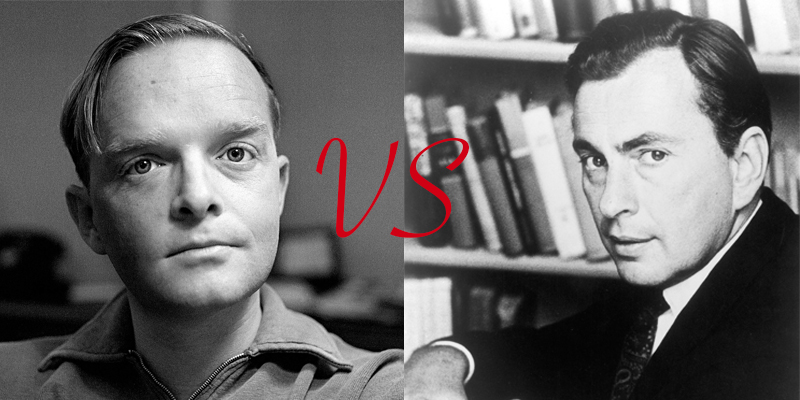
Truman Capote vs. Gore Vidal
This feud was all about literary jealousy. Early on, Vidal was disgruntled at the appearance of a Life magazine photo spread entitled “Young U.S. Writers: A Refreshing Group of Newcomers on the Literary Scene is Ready to Tackle Almost Anything.” It’s not that Vidal wasn’t included—he was, in a tiny, awkward photo. Capote rated three-quarters of the first page. Socially, they were cordial, but Vidal was offended by Capote’s manner and irritated by his name-dropping. “The instant lie was Truman’s art form, small but, paradoxically, authentic,” he wrote. “One could watch the process. A famous name would be mentioned. The round pale fetus face would suddenly register a sort of tic, as if a switch had been thrown. ‘Eleanor Roosevelt. Oh, I know her intimately!'”
The rivalry was mostly made up of petty things—a comment here, a snub there, a bad review whenever called for. “I first met Truman at Anaïs Nin’s apartment,” Vidal once said. “My first impression—as I wasn’t wearing my glasses—was that it was a colourful ottoman. When I sat down on it, it squealed. It was Truman.” Once, according to Fred Kaplan’s biography, Vidal called up Tennessee Williams and, pretending to be Capote, elicited some “uncomplimentary remarks” about his own writing. Then, when he next saw Williams, he alluded to those remarks, in order to make him believe Capote has betrayed him by repeating the conversation. That’s some brilliant mean girl-ing. He also famously called Capote’s death “a brilliant career move.”
Hilton Als interpreted the feud this way:
[Vidal’s] disdain for Truman Capote—another child of an alcoholic mother—had less to do with Capote’s impulse to embellish the truth than with his skill at imagining characters, no matter how derivative his early short stories were. (Vidal never produced anything in fiction on the order of Capote’s Miriam, Among the Paths to Eden, let alone Breakfast at Tiffany’s or In Cold Blood.) And I think Vidal rather resented Capote being, often, the only other known out homosexual in the room. (Vidal could love Tennessee Williams because the stage was Williams’s thing, not prose.)
I would be remiss if I didn’t add Capote’s much-quoted quip: “I’m always sad about Gore—very sad that he has to breathe every day.” And in an interview after Capote’s death, Vidal shuddered, “Capote I truly loathed. The way you might loathe an animal. A filthy animal that has found its way into the house.”
9: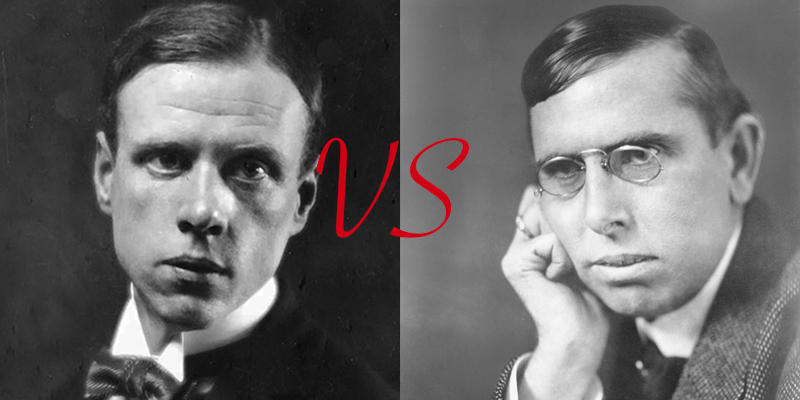
Sinclair Lewis vs. Theodore Dreiser
A 1931 article in The Montreal Gazette (headline: “Noted Authors in Reported Fracas“) cites the Evening Post to report that “Theodore Dreiser, novelist, slapped the face of Sinclair Lewis, Nobel literary prizewinner, at a dinner last night.”
For context, Lewis had just beat out Dreiser for the Nobel Prize, becoming the first American to receive the honor—though some interpreted the choice as a subtle snub to the entire country by the Swedes. Dreiser was devastated, and though Lewis tried to reach out to him, Dreiser wouldn’t have any of it.
Now they were both at a literary dinner for a Russian novelist. According to Anthony Arthur in his Literary Feuds, Dreiser congratulated Lewis, but Lewis responded with a “sneer,” and then, during the meal, “fondled a bottle by the neck and muttered how he’d like to break it over Dreiser’s head.” Lewis was asked to give an impromptu speech, but refused, standing up and saying “I feel disinclined to say anything in the presence of the man who stole 3,000 words from my wife’s book and before two sage critics who publicly lamented my receiving the Novel Prize.” In 1928, Dreiser had been accused of plagiarizing parts of The New Russia by Sinclair’s wife Dorothy Thompson for his volume Dreiser Looks at Russia.
After the meal, Dreiser confronted Lewis. “I know you’re an ignoramus, but you’re crazy,” Dreiser said. Lewis repeated his claims, and Dreiser slapped him. Or, as he reported it: “I smacked him. And I asked him if he wanted to say it again. He said it again. So I smacked him again. And I said, ‘Do you want to say it again?'” According to Arthur:
At this point Lengel entered the room and heard Lewis say, “Theodore, you are a liar and a thief.” Lengel grabbed Lewis, thinking to restrain him from attacking Dreiser, but Lewis was limp and unresisting. Lengel told Dreiser that he’d better leave. Lewis said again, “I still say you are a liar and a thief.” “Do you want me to hit you again?” Dreiser demanded. “If you do, I’ll turn the other cheek.” Dreiser said, “Aw, Lewis, you shit!” Lengel was pushing the bigger man through the door when he turned and shouted, “I’ll meet you any time, anywhere. This thing isn’t settled.” Lewis followed, muttering something. Dreiser said, “Lewis, why don’t you peddle your papers somewhere else?”
The tabloids were all over this, and Dreiser reportedly got a few complimentary telegrams, including one that said: “Thank you for slapping Sinclair Lewis. You did just what many thousands of Americans would like to do.” Well, Lewis still got the Nobel.
8: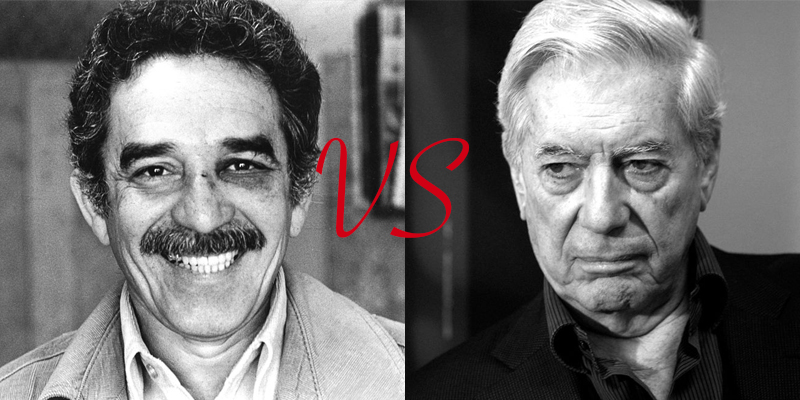
Gabriel García Márquez vs. Mario Vargas Llosa
February 12th, 1976: Mario Vargas Llosa and Gabriel García Márquez meet in Mexico City at a movie premiere. García Márquez is happy to see his friend—who promptly punches him in the face, leaving him bleeding, and shouts “How dare you come and greet me after what you did to Patricia in Barcelona!” Patricia, of course, was Vargas Llosa’s wife. According to the Independent (via the New Yorker):
Mario strayed. He fell in love with a beautiful Swedish air stewardess whom he met while travelling. He left his wife and moved to Stockholm.
Distraught, his wife Patricia went to see her husband’s best friend, Gabriel. After discussing the matter with his wife, Mercedes, he advised Patricia to divorce Mario. And then he consoled her. No one else quite knows what form this consolation took…. Eventually Mario returned to his wife, who told him of Gabriel’s advice to her, and of his consolation.
Hence the famous black-eyed photograph of García Márquez. “I took the picture two days after the incident, when he came to my house,” said friend and photographer Rodrigo Moya. “It was difficult to take a picture in which he looked this good. I have some pictures in which he looks like he was really beaten up, like beaten up by the Mexican police.” Since then, both writers have won the Nobel Prize in Literature, but as legend would have it, they never spoke again.
7: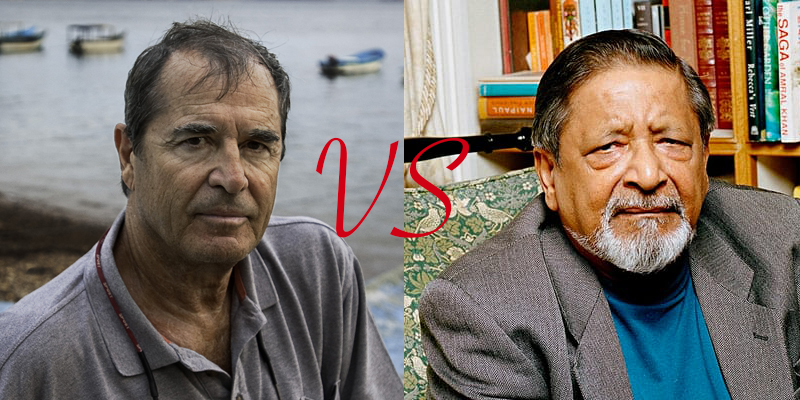
Paul Theroux vs. V.S. Naipaul
In the 90s, V.S. Naipaul, who reportedly suspected his longtime friend Paul Theroux of seducing his wife, sold off a book that Theroux had personally inscribed to him, getting about $1,500 on the internet. Theroux responded by writing a very damning book about their friendship, Sir Vidia’s Shadow: A Friendship Across Five Continents, which he later called an “unsparing and accurate portrait of the man, minus the instances of racism and physical abuse that I was forbidden by lawyers to publish. . . In thirty years . . . I mainly saw his sadness, his tantrums, his envy, his meanness, his greed, and his uncontrollable anger. But I never saw Naipaul attack anyone stronger than himself; he talked big and insultingly but when he lashed out it was always against the weak—women who loved him, his wife, and waiters: people who couldn’t hit back, the true mark of the coward.”
But in 2011, after fifteen years of animosity, the two made up—or at least shook hands. According to the Guardian: “Spotting Naipaul in the green room at the Hay festival, Theroux turned to McEwan and asked what he should do. “Life is short,” McEwan replied. “You should say hello.” And with that, handbags were holstered.” As Naipaul’s wife described it: “Paul approached him and said he missed him. It was very gracious and wonderful of him. So that is the end to the literary feud.”
“After so many years, we’ve finally spoken,” said Theroux. “I just had an experience today with a capital E.”
6: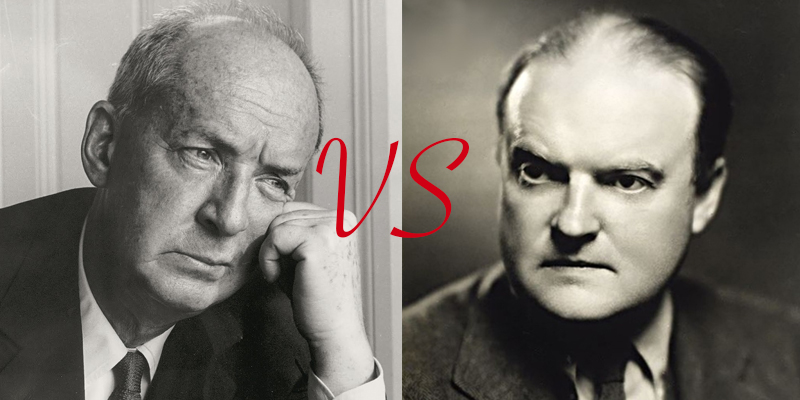
Vladimir Nabokov vs. Edmund Wilson
This is about as literary as a feud can get: fighting over Pushkin. In 1965, Nabokov published a four-volume translation of the Russian writer’s Eugene Onegin—and his friend “Bunny” panned it in The New York Review of Books. Nabokov responded in the same publication, writing
I fully share “the warm affection sometimes chilled by exasperation” that he says he feels for me. In the 1940s, during my first decade in America, he was most kind to me in various matters, not necessarily pertaining to his profession. I have always been grateful to him for the tact he showed in refraining from reviewing any of my novels. We have had many exhilarating talks, have exchanged many frank letters. A patient confidant of his long and hopeless infatuation with the Russian language, I have always done my best to explain to him his mistakes of pronunciation, grammar, and interpretation.
He then proceeds to rebut Wilson’s review, point by point, but stops himself, on the basis of the “strange tone” of the review. “Its mixture of pompous aplomb and peevish ignorance is certainly not conducive to a sensible discussion of Pushkin’s language and mine,” he finishes. Wilson responded again, although with less fervor.
That wasn’t the only problem, of course. Wilson had also hated Lolita, and was competitive with the increasingly more-famous Nabokov, and they also butted heads politically—but it was the Pushkin thing that tipped them over the edge.
5: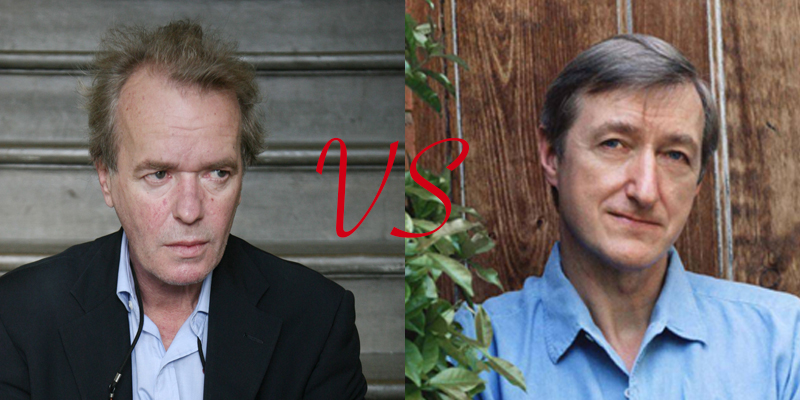
Martin Amis vs. Julian Barnes
Martin Amis has made a lot of enemies along the way. But one of the earliest was his longtime friend Julian Barnes, whom he alienated on account of what sounds a lot like greed. Amis wanted a £500,000 advance for his 1995 novel The Information. Jonathan Cape offered £300,000—so Amis fired his agent, Pat Kavanagh, in favor of Andrew Wylie, who got him the money (which he reportedly wanted for dental work). The only problem was that Pat Kavanagh and her husband, Julian Barnes, were close friends of Amis’s—and Barnes was not pleased. According to the Independent:
Barnes wrote to Amis to wish him the same success as two other Wylie clients: Salman Rushdie, who was living in fear of his life because of a fatwa, and Bruce Chatwin, who died of AIDS. The letter was signed off with two words, the second of which was “off.”
Amis told the Observer that he was in a bad place at the time—he was in the midst of a divorce and his father had just died—and was “shocked” by the letter. “It was naive of me not to anticipate it,” he said. Apparently, they patched things up, but it took a decade to do it.
4: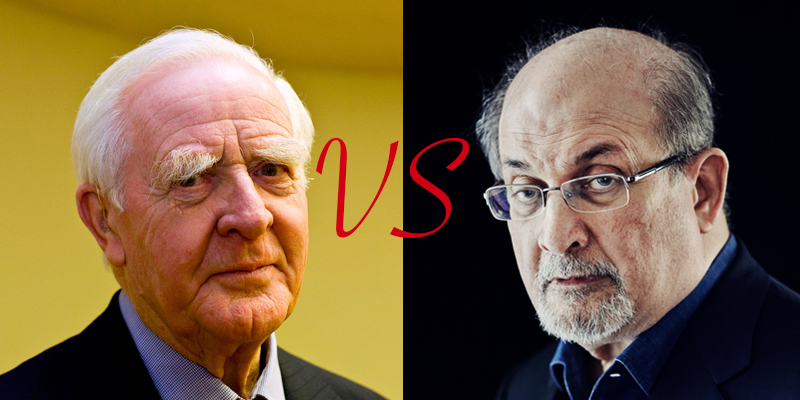
John le Carré vs. Salman Rushdie
This one’s a corker. It started in 1997, when John le Carré complained in the letters section of the Guardian that he had been unfairly attacked by American readers for anti-Semitisim.
Salman Rushdie responded: “It would be easier to sympathize with him had he not been so ready to join in an earlier campaign of vilification against a fellow writer. In 1989, during the worst days of the Islamic attack on The Satanic Verses, le Carré wrote an article (also, if memory serves, in the Guardian) in which he eagerly, and rather pompously, joined forces with my assailants.”
Le Carré came back: “Rushdie’s way with the truth is as self-serving as ever. . . My position was that there is no law in life or nature that says that great religions may be insulted with impunity. . . My purpose was not to justify the persecution of Rushdie, which, like any decent person, I deplore, but to sound a less arrogant, less colonialist and less self-righteous note than we were hearing from the safety of his admirers’ camp.”
Rushdie: “I’m grateful to John le Carré for refreshing all our memories about exactly how pompous an ass he can be.”
Le Carré: “Whether from Rushdie’s throne or Hitchens’ gutter, the message is the same: ‘Our cause is absolute, it brooks no dissent or qualification; whoever questions it is by definition an ignorant, pompous, semi-literate person.’ . . . Rushdie sneers at my language and trashes a thoughtful and well-received speech I made to the Anglo-Israel Association. . . Hitchens portrays me as a buffoon who pours his own urine on his head. Two rabid Ayatolahs could not have done a better job. But will the friendship last? I am amazed that Hitchens has put up with Rusdhie’s self-canonisation for so long.
Rushdie: “If he wants to win an argument, John le Carré could begin by learning to read. . . It’s true I did call him a pompous ass, which I thought pretty mild in the circumstances. ‘Ignorant’ and ‘semi-literate’ are dunces’ caps he has skillfully fitted on his own head. I wouldn’t dream of removing them. . . John le Carré appears to believe I would prefer him not to go on abusing me. Let me assure him that I am of precisely the contrary opinion. Every time he opens his mouth, he digs himself into a deeper hole. Keep digging, John, keep digging. Me, I’m going back to work.”
In 2011, the two patched things up. Rushdie extended the olive branch first (at least publicly)—speaking at a literature festival, he said “I wish we hadn’t done it,” and complimented le Carré’s literary chops. “I think of Tinker Tailor Soldier Spy as one of the great novels of postwar Britain,” he said. Le Carré responded in The Times:
I too regret the dispute. I admire Salman for his work and his courage, and I respect his stand. Does that answer the larger debate which continues to this day? Should we be free to burn Korans, mock the passionately held religions of others? Maybe we should—but should we also be surprised when the believers we have offended respond in fury? I couldn’t answer that question at the time and, with all good will, I still can’t. But I am a little proud, in retrospect, that I spoke against the easy trend, reckoning with the wrath of outraged Western intellectuals, and suffering it in all its righteous glory. And if I met Salman tomorrow? I would warmly shake the hand of a brilliant fellow writer.
At least one person wasn’t too happy about that. “The le Carré-Rushdie quarrel was (and is) between those who think that religion should be protected from ‘offensive’ critiques, and those who do not,” Christopher Hitchens said. “This is the original confrontation over free speech, which goes back to the trial of Socrates. I therefore did my best to make sure that no compromise or kiss-and-make-up was thinkable. One’s job on such occasions, when seeing the embers begin to cool, is to blow on them as hard as possible.”
3: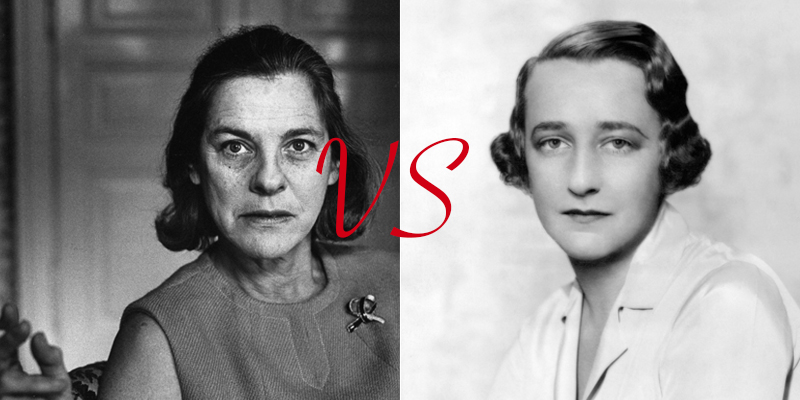
Mary McCarthy vs. Lillian Hellman
Another Dick Cavett-based feud! When Cavett asked Mary McCarthy to name some over-rated writers (on the air), she noted John Steinbeck, Pearl Buck, and Lillian Hellman, “who I think is tremendously overrated, a bad writer, and a dishonest writer, but she really belongs to the past.”
Cavett dramatizes what happened next:
“What’s dishonest about her?” I asked.
“Everything,” said McCarthy. “I said once in some interview that every word she writes is a lie, including ‘and’ and ‘the.’ ” There was an “ooh” and a laugh from the audience, but otherwise the moment passed innocuously. After the taping, the network’s lawyer—paid to anticipate litigation—did not utter even his occasional “Dick, we may have a problem.” Instead, he said, “Nice show.”
During breakfast the next morning, my assistant called. “Have you seen the papers?” she said. “Hellman is suing Mary McCarthy, PBS, and you for two and a quarter million.”
“And me?” I replied, in a prepubescent squeak. The other phone rang, and the familiar whiskey-and-cigarettes baritone rasped, “Why the hell didn’t you defend me?”
“I guess I never thought of you as defenseless, Lillian,” I managed.
“That’s bullshit. I’m suing the whole damn bunch of you.” In that, at least, she proved a woman of her word.
McCarthy laughed it off at first, but soon became nervous—after all, she didn’t have more than $63,000 in the bank, and Hellman was wealthy. Norman Mailer (the pugilist himself) published an appeal to the two of them in the New York Times, asking Hellman to drop the suit, but to no avail. At the New Republic, Franklin Foer writes:
[Hellman] was not at all interested in preserving mutual respect in discourse. What she wanted was to see McCarthy bleed—a sadistic course that she, unlike McCarthy, could afford to take, given her personal wealth and her pro bono lawyer. When her friend Roger Straus tried to convince her to drop the suit, Hellman replied, “No, I’m gonna teach her a thing or two.”
. . .
With her lawsuit, Hellman lucked into a sympathetic judge. Presented with a myriad of opportunities to dismiss the case—McCarthy’s statement was clearly intended as a joke; it was an act of literary criticism; Hellman was a public figure—he declined to reject it. If Hellman had prevailed, she would have succeeded in turning harsh literary criticism into a legally punishable offense. But she did not prevail. Four years into the suit, she died, which ended the matter. This fact did little to becalm McCarthy, who told The New York Times that “I’m absolutely unregenerate. . .I didn’t want her to die. I wanted her to lose in court. I wanted her around for that.”
2: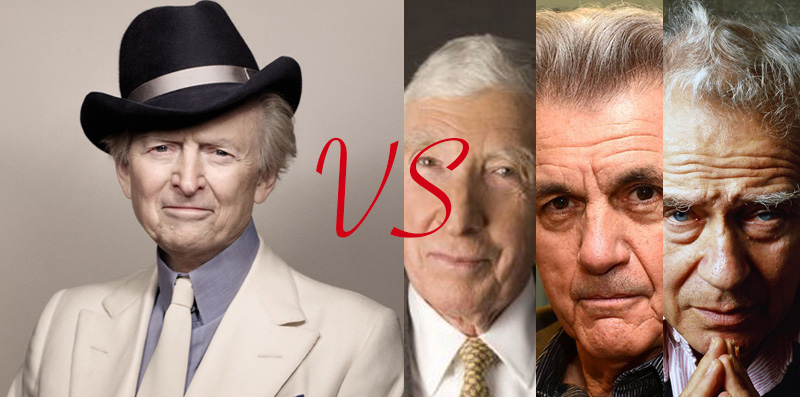
Tom Wolfe vs. John Updike, Norman Mailer, and John Irving
In 1998, Tom Wolfe published his second novel, A Man in Full. It had some notable detractors. Norman Mailer wrote in the New York Review of Books:
The book has gas and runs out of gas, fills up again, goes dry. It is a 742-page work that reads as if it is fifteen hundred pages long. This is, to a degree, a compliment, since it is very rich in material. But, given its high intentions, it is also tiresome, for it takes us down the road of too many overlong and predictable scenes. Electric at best, banal at worst—banal like a long afternoon spent watching soap operas—one picks it up each day to read another hundred pages with the sense that the book not only offers pleasure but the strain of encountering prose that disappoints as often as it titillates.
At certain points, reading the work can even be said to resemble the act of making love to a three-hundred-pound woman. Once she gets on top, it’s over. Fall in love, or be asphyxiated. So you read and you grab and you even find delight in some of these mounds of material. Yet all the while you resist—how you resist!—letting three hundred pounds take you over.
John Updike, in a review of the novel in the New Yorker titled “Awriiiiighhhhhhhhht!,” wrote that “A Man in Full still amounts to entertainment, not literature, even literature in a modest aspirant form. Like a movie desperate to recoup its bankers’ investment, the novel tries too hard to please us.”
On a Canadian TV show called Hot Type, John Irving was asked to comment on the “war” between the three. “I don’t think it’s a war, because you can’t have a war between a pawn and a king, can you?” he said. He then proceeded to call Wolfe’s novels “yak” and “journalistic hyperbole described as fiction” and said his work was “like reading a bad newspaper or a bad piece in a magazine. It makes you wince.”
Hot Type had Wolfe on next, who said of Irving: “He’s our prime subject today. His last, A Widow for One Year, is about some neurotic people in the Hamptons. They never get to town. They’re in the house. They’re neurotic. . . Irving is a great admirer of Dickens. But what writer does he see now the last year constantly compared to Dickens? Not John Irving, but Tom Wolfe. . . It must gnaw at him terribly.” Wolfe called his three detractors “Larry, Curly and Moe” and later wrote an essay about the whole thing called “My Three Stooges,” which he published in his 2000 collection Hooking Up, and which refers to Mailer and Updike as “two old piles of bones” and calls Irving’s Hot Type interview a “temper tantrum.”
Irving’s face turned red. His sexagenarian jowls shuddered. He began bleeping. It was all the show’s technicians could do to hit the bleep button fast enough. “Wolfe’s problem is, he can’t bleeping write! He’s not a writer! Just crack one of his bleeping books! Try to read one bleeping sentence! You’ll gag before you can finish it! He doesn’t even write literature—he writes . . . yak! He doesn’t write novels—he writes journalistic hyperbole! You couldn’t teach that bleeping bleep to bleeping freshmen in a bleeping freshman English class!”—and on and on in that mode. It was spellbinding. I don’t pretend to be a lip reader, but it took no particular expertise to decode bleepos that began with such bitterly lower-lip-bitten fs. Evan Solomon kept covering his face with his hand and smiling at the same time, as if to say, “How can the old coot make such a spectacle of himself—but, wow, it’s wonderful television!”
In a 2001 interview in Details magazine, Irving said, “I don’t know a serious writer who reads Tom Wolfe. . . [but] I would never have said Wolfe was a ‘bad’ writer had he not written his absurd position paper on how to write the American novel.” The “position paper” in question was “Stalking the Billion-Footed Beast,” published in Harper’s in 1989, bemoaning a perceived decline in realist literature (Mailer pointedly mocks the opening of the piece with his aforementioned NYRB review).
In a video recorded in 2009, Irving said:
I don’t know, I think [literary feuds] are all generated by a kind of compiled misunderstanding. I give Wolfe the benefit of the doubt that he did not write that white paper manifesto about how the rest of us should be writing the great American novel. The piece he published in Harper’s, I believe, after Bonfire of the Vanities was first published. I don’t imagine when he wrote that that he was aware of how many writers who’d been writing fiction longer and writing it better than he does, might have been offended by that prescriptive piece. Maybe he didn’t know. Maybe he was just speaking from the heart, and he didn’t know it would be irritating. But I know that that was the source of what provoked me at him, and I know it was also the source of what provoked Updike, with him too. I remember a letter from John saying that he never would have taken Wolfe so much to task in that New Yorker piece if it hadn’t been for that earlier manifesto. But you know, I think it’s an overrated feud. He and I ran into each other—he was with his wife; I was with one of my children—we ran into each other on the Washington Mall a few years ago, after all this squabbling had been much publicized, over-publicized, in my opinion, in the media. And I didn’t think it was an especially awkward or hostile meeting. I mean, we got through it without spitting and scuffling or kicking dirt on each other’s shoes. They said nice things to my son, and I believe that we were both perfectly cordial to one another, so not much of a feud in my opinion. There’s certainly people that you in the media don’t know about that if I ran into them, more sparks would fly.
Consider my curiosity piqued.
1: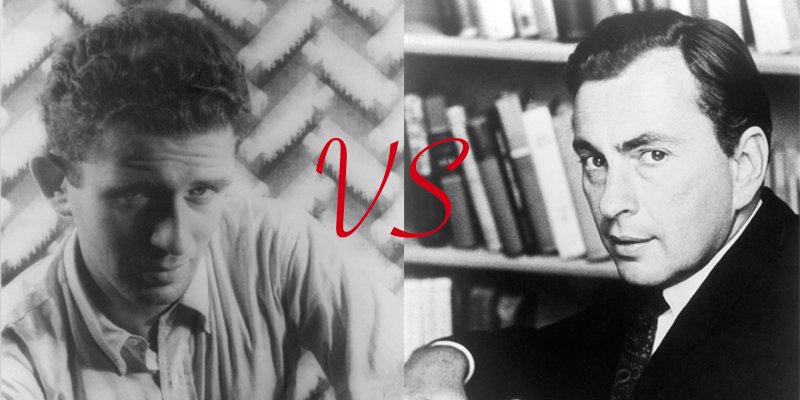
Norman Mailer vs. Gore Vidal
One of the true legends: the time Norman Mailer head-butted Gore Vidal backstage before appearing with him on the December 15th, 1971 episode of the Dick Cavett show (alongside journalist Jane Flanner). There’s no footage of the head-butt, but happily there is footage of the ensuing squabble, which you can watch below. As Dick Cavett himself described it:
Mailer’s entrance was the tip-off. He came on from stage left doing that pugilist walk: his hands were fists and carried high, and he had the tousled look of having visited a favorite bar or two en route. His suit was disheveled, his bow to Miss Flanner courtly, and his refusal to shake Vidal’s extended hand caused a murmuring in the audience.
After that, the battle begins—Mailer is incensed over an essay Vidal has written criticizing him in The New York Review of Books (actually a review of Eva Figes’ Patriarchal Attitudes, but he did compare Mailer to Charles Manson, in passing), and proceeds to take pot shots at everyone’s intelligence, not to mention try to physically intimidate the other guests. Flanner sums it up when she complains about the bickering: “Not only do you insult each other, not only in public, but as if you were in private. That’s the odd way . . . It’s very odd that you act so—you act as if you were the only people here.” Mailer: “Aren’t we?” Flanner: “They’re here, he’s here, I’m here. And I’m becoming very, very bored.” The audience laughs and claps, and Flanner bows Mailer a kiss. It’s a great line, but there’s nothing boring about what’s going on.
No blows were exchanged on television, but six years later, the two met again at a party, and Mailer hit Vidal in the face, knocking him down. “Once again, words fail Norman Mailer,” said Vidal, before getting back to his feet.
Emily Temple
Emily Temple is the managing editor at Lit Hub. Her first novel, The Lightness, was published by William Morrow/HarperCollins in June 2020. You can buy it here.



















